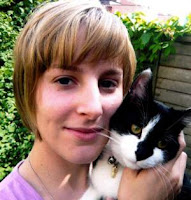Be not forgetful to entertain strangers: for thereby some have entertained angels unawares.
– St. Paul’s Epistle to the Hebrews, Chapter 13, Verse 2
The torture is explained at the end of this post
The blackmail
 |
| Joanna Yeates |
After
Vincent Tabak was arrested on
20th January 2011, his relatives in the Netherlands assumed that their gentle, courteous younger brother would be quickly released, just as his
landlord had been. They were stunned when he was charged on
22nd January 2011 with killing
Joanna Yeates. Contacted by journalists, the immediate reaction of his
brother and elder sister was that to accuse the police of using him as a ‘
scapegoat’. They claimed that under-pressure detectives had ‘panicked’ when they arrested him.
 |
| Bristol Prison, Horfield |
Avon & Somerset Constabulary reacted swiftly to this
slur on their reputation – just as they had done on
5th January 2011 when
they
banned ITN from their news conferences. They transferred Vincent Tabak to
Bristol prison after his
appearance before the magistrate
William Summers. After his failure
to enter any plea, the other inmates, who had all seen the reports of his
appearance on TV, assumed that he was guilty, as did the general public.
Despite the absence from Bristol prison of the most violent criminals, Vincent
Tabak (according to Alun Palmer reporting in The Mirror) spent a sleepless night of terror cowering in his cell before facing
Mr Justice Treacy at the bail hearing the following day. By his failure to ask one simple question, Mr. Summer administered torture without lifting a finger.
 |
| Tabak family spokesman Paul Vermeij |
Vincent Tabak spent the next night or two in
Gloucester prison.
Terrified for their brother’s safety, his family in the Netherlands responded
to this intimidation by appointing a press representative to mollify the police
and the
CPS. Explaining that Vincent had talked on
26th January 2011 to his girlfriend,
Tanja Morson,
Paul Vermeij, the spokesman for the Tabak family, said: “Vincent seems to be coping with what has happened to him. He has remained positive about it. “He told her ‘I am safe, I am positive’. He is confident there will be a good outcome to this. He says the prison staff are treating him well.”
 |
He spent a night of
terror before facing
Judge Colman Treacy |
However, worse was to come. A couple of days later he was
transferred even further away, to
Long Lartin prison, which has a high
concentration of the most violent criminals. According to The Sun, Vincent
Tabak was placed on suicide watch around the clock. Staff at the top-security
prison had been told to check the 32-year-old every 30 minutes throughout the
day and night. An insider said: “He has been placed under constant
observation by the assessment care in custody team. He’ll be escorted wherever
he goes by two staff. Specialist psychiatrists will also be closely monitoring
him.”
 |
| Gloucester prison |
According to the Government’s “Strategic Plan for
Criminal Justice 2004-08” presented to parliament in
July 2004, “Too
many offenders insist on the full judicial process, then plead guilty at the
last minute, clogging up the courts when we should be encouraging them to plead
guilty earlier.” (quoted in
Sandra Lean’s book
“No Smoke!”.) This begs the question of how those charged with the task
of “persuasion” are supposed to distinguish between genuine offenders and
innocent remand prisoners charged, like Vincent Tabak, on the basis of
insufficient or phoney evidence. The methods of persuasion include:
- Intimidation
by the threat or actual use of various forms of torture
- Trickery
– the obtaining of a false confession, false plea and disparate leniency in a totally unrelated trial in another part of the country
- Blackmail
– the offer of a reduced sentence (four years less remission down from twenty years plus) in return for an early confession
 |
| His global employer Buro Happold at Bath |
He was especially vulnerable to coercion:
- by virtue of his Ph.D – the equivalent of carrying your life-savings on your person – which provided an added incentive for him to agree to anything that would get him out of prison as soon as possible.
- by virtue of being a foreigner, so he had no family in the UK to fight for him.
- by virtue of his naivety and inexperience of crime.
- because his global employer Buro Happold could not afford to have its reputation sullied by the news that it had head-hunted an architectural consultant charged with strangling an architect.
- his legal team was chosen for him by the police and the prosecution.
- the “Stockholm syndrome”, which compelled him to form a close attachment to his captors and his compromised legal team.
- his loneliness and isolation, as distance meant that his family could visit him only occasionally.
 |
So-called prison chaplain Peter Brotherton. He did not
tell the court that he was a senior officer employed
at a prison in Cambridgeshire, Whitemoor. |
Instead of being presumed innocent until proved guilty by
means of conclusive evidence, Vincent Tabak had been intimidated to the point
of suicide and was now to be tricked into providing the material that would be used in court for a false confession. The
Salvation Army chaplain
Peter Brotherton told the court he had been a prison
visitor since
1975. By agreement with the Home Office, he was assigned to
volunteer as a Chaplain at Long Lartin prison in
January 2011, and was sitting
there on
2nd February 2011, waiting for Vincent Tabak to contact him
for advice about his case and guidance in the choice of a good solicitor to replace the
lawyers who had failed to secure bail for him. He assured the desparate prisoner that their
conversations would be confidential, but nevertheless he noted everything down
as if he were a detective, went away to his priest-hole afterwards, and “boiler-plated”
selected sentences together to produce a statement, which he signed and passed
on to the authorities. This statement would be used to manipulate the
jury into believeing that Vincent Tabak had
confessed to killing Joanna Yeates. It was submitted to the
prosecution, who in
due course passed a copy to Vincent Tabak’s solicitor
Ian Kelcey.
 |
| Solicitor Ian Kelcey |
There was no reason why he should have made a spontaneous
confession. It is hardly likely that Vincent Tabak had found life in Long
Lartin Prison so congenial that he had decided he preferred it to life outside. If any new evidence had been presented in the murder charge against him, it was evidence that would never be led in court. Even if he
actually had killed “the young lady from Bristol”, a killer who had withstood
her parents’ reiterated tearful appeals on TV, and resisted the kind of police
interrogation that his
landlord had described as “a kind of rape”, would hardly
be likely to suffer sudden pangs of conscience because he was confronted with
Mr. Brotherton. The validity of a confession depends on the circumstances under
which it is made and the vulnerability of the person who makes it. So it is
astonishing that the gullible
jury, the
media and everyone else would take this
faked prison confession at its face value.
 |
| His girlfriend Tanja Morson |
Vincent Tabak did not receive any visits in prison from the
date of his arrest on
20th January until
11th February 2011 – the day of Joanna
Yeates’s funeral – when his
girlfriend, his brother and a female family friend
were permitted to visit him. The Home Office had received instructions from the
CPS to withdraw Vincent Tabak’s right to the three visits a week that prison
rules permit prisoners on remand, as a punishment for the independent
post-mortem ordered by his solicitor. The police had already held back
the body
for nearly four weeks, but now they could blame the delay to the funeral on
Vincent Tabak and punish him by keeping him apart from his girlfriend and
family. The Home Office probably also intended to ensure that Tanja Morson did not attract media sympathy by attending her
neighbour’s funeral.
The Police Liaison Service, meanwhile, were blackmailing him via his solicitor by threatening to tell his girlfriend about the
prostitutes they would claim he had patronized during his business trips, the adult
pornographic videos they would allege he had constantly been viewing on his computers when her back was turned, and the illegal
images of child abuse that were allegedly found on his Dell laptop computer. Tanja Morson was the only person in the UK who was close to him. Unlike a blood relation, however, she was inherently vulnerable to intimidation by the police. If she could be persuaded that he had not been true to her, she would need to turn elsewhere for consolation. He had tried to defuse the blackmail during her all-too-brief visit to the prison by reassuring her that his activities had been far more innocent and moderate than the police would be claiming. After her visit, they may have laid it on thick to her about the call girls, the pornographic videos and images of child abuse discovered from his telephone records and hard discs, and they did succeed in neutralising her. This would have happened by
4th March 2011 – the date when
Christopher Jefferies was finally released from bail.
Did the police and the
CPS threaten to prosecute
Tanja Morson for complicity, but offer to let her off the hook if Vincent agreed to stand trial on the basis of the faked
manslaughter plea? The
“sobbing girl” ruse and the declaration he had made
after his arrest that he had been the sole user of his laptop computer suggest that they did. It was Tanja Morson who had actually made the fatal
phone call from Holland that automatically became an attempt to incriminate their
landlord, once Vincent Tabak stood trial for killing Joanna.
It added two years to his sentence. How much time might Tanja have had to serve in prison if she were sentenced
as an accomplice? The stance taken by
the defence in all other respects suggests that they knew that her testimony would favour the defendant’s case if she were to be called as a witness. Her failure to be called as a witness may, therefore, have been part of the price that Vincent had to pay in return for her not being
prosecuted for complicity. Was he honour bound to
sacrifice himself to protect his girlfriend?
 |
The massive forensics examination of Joanna Yeates’s
flat and front door |
The prosecution probably made the false claim that the massive forensics examination of Joanna’s flat and front door had revealed conclusive evidence of her blood and Vincent Tabak’s
DNA. On this basis, both Crossman & Co and later Mr. Kelcey would be able to advise their client to stand trial for manslaughter. This “sacrificial evidence” would never be submitted to the
jury, but by that time it would be too late.
Mr Kelcey must have pointed out that it would be
disastrous for Vincent Tabak to stand trial on the basis of his innocence, as he would be handing the
case to the prosecution on a plate. If he accepted manslaughter, on
the other hand, he could look forward to a short sentence with the prospect of
remission for good behaviour. Mr. Kelcey evidently had reasons of his own for
not challenging the weak case against his client. A lonely,
abandoned Vincent Tabak took the fatal decision to follow his solicitor’s
urging – even though he knew it was not he who had killed his neighbour.
Meanwhile, in
Manchester Crown court, a certain
Daniel Lancaster was about to be tried for – unnoticed by the national media – having
brutally murdered his girlfriend in Yorkshire,
Anna Banks, by strangling her, a
few days after a similar fate befell Joanna Yeates. Did someone in Bristol make a
request to the prosecution in Manchester for leniency for the worthless young
junkie? The result of his trial was that on
11nd August 2011 he was to receive a sentence
of only four years for manslaughter, with a chance of remission for good
behaviour. Presented by his solicitor with the news of this verdict on
22nd September
2011, a very reluctant Vincent Tabak was tricked into signing a
statement that
(just like the phoney
DNA evidence against him) had been
“enhanced” so much
that it bore little resemblance to the truth. In it, he admitted that he
unintentionally strangled Joanna Yeates by holding her neck for 20 seconds to
stop her screaming. It described in detail the sequence of events that were
supposed to have surrounded her death.
After he was sentenced to life in prison, to the great
distress of his family in the Netherlands, and especially his 70-year-old
widowed mother, The Sun’s correspondent in Arnhem, Stephen Moyes, reported an
unidentified family friend as saying that Vincent Tabak hoped he would be able
to transfer to a prison in the Netherlands, adding that he was terrified of
being beaten up in an English prison. They knew that a condition for his ever being transferred was that they keep silent about his innocence. The prospect of a transfer to a prison in the Netherlands is one of the carrots that could have been used to persuade him to plead guilty, after his encounter with the chaplain proved to him that he had fallen into the power of authorities who did not believe in playing the game according to the rules.
 |
Tanja Morson thanked
the judge, Mr Justice
Field, and the lawyers for
their on-going attention
and professionalism |
In her speech of triumph after the trial,
Ann Reddrop of the CPS made a statement in which she asserted that Vincent Tabak had been cunning and dishonest towards his girlfriend. This forced
Tanja Morson to issue a public statement the following day, in which she thanked to the judge, the jury, the barristers and the solicitors for all their on-going attention and professionalism. If she had not done this, she knew he would be beaten up.
 |
| Joanna Yeates’s parents |
Just after the end of his trial, a police spokesman read out
a hate-statement from Joanna Yeates’s
parents containing the following sentence
about Vincent Tabak: “The best we can hope for him is that he spends the
rest of his life incarcerated, where his life is a living hell, being the
recipient of all evils, deprivations and degradations that his situation can
provide.” In order to carry out this vengeful wish from the victim’s
family, an anonymous police spokesman told the Bristol Evening Post that thirty
illegal Group 4 images showing children being abused had been found on Vincent
Tabak’s laptop computer. This
malicious falsehood fabricated by Avon & Somerset Constabulary’s Director of Corporate Communications was carried by the
national media, and was studied with especial interest by the inmates of the
prison where he was incarcerated, enabling
Amanda Hirst to torture Vincent Tabak by proxy.
 |
| Children being abused |
The torture
The forms of torture to which we know Vincent
Tabak was subjected are: identity deprivation, isolation, the punishment of his girlfriend and his family, involuntary celibacy,
and the threat of violence. In addition, he was probably exposed to “loud
music” and he may have been subject to false memory syndrome. He was
possibly subjected to the threat of sexual assault from other inmates. A
prisoner who is subject to or threatened with torture cannot tell the outside
world (or even his family) about it, for fear of further deprivation and/or torture.
He is told: “Make sure that you say you were treated properly”. Paul
Vermeij, the spokesman for Vincent Tabak’s family, told The Mirror (27th
January 2011) that he said that the prison staff were treating him well.
 |
| Christopher Jefferies |
The landlord Christopher Jefferies has given us
a description of the identity deprivation to which he was subjected during his
own three days of police interrogation. His clothes were taken away from him,
and he was provided with other clothes, while his interrogators constantly
attempted to replace his own identity with an alien identity. He asserted that
this was tantamount to a kind of rape. Vincent Tabak also had his own
customized glasses taken away and replaced by a standard pair that would have
made eye contact harder for him. These would also have made it hard or impossible for him to read the statements that he signed while he was in the police station. At his appearance before the magistrate he was
unkempt, unshaven and dishevelled after three days’ interrogation. This is
reflected in the appalling portrait photo of him released to the media by the
police.
 |
| Vincent Tabak |
Vincent Tabak was not allowed any visitors for nearly three
weeks after his arrest, isolating him from the outside world. Had he been held
in a remand centre, all of whose inmates were presumed innocent, there would
have been no reason why he should have been isolated from these other inmates.
Instead, he was remanded in a succession of prisons where we know he had to be
protected from other inmates, thereby increasing his isolation. The society of
non-violent petty criminals does not constitute isolation for a petty criminal,
but for an academic foreigner with a Ph.D and an introvert personality who has
nothing in common with them, it would constitute a form of isolation. Although
he is fluent in English, not being able to speak his mother tongue Dutch to
anyone would also increase his sense of isolation. Not receiving
regular visits from his family because they are far away in Holland is one of the most cruel features of his isolation.
The constraints of imprisonment for a serious crime is not just a physical form of torture – in a matter of days and weeks it
deprives you of your familiar identity, and turns your
personality permanently into something hard and unsympathetic that will
scarcely be usable in the world outside. In prison,
you can trust nobody – not your fellow prisoners, not the doctor or nurse who humiliates you with an intimate medical examination, not the guards, not the chaplain, not your lawyer, not even your own family or your girlfriend. Nor does any of them trust you.
When he did open his mouth, Vincent Tabak Ph.D had been
accustomed to being listened to by colleagues, clients, friends and family members who valued what he had to say. Suddenly, without warning on
20th January 2011, he had entered a weird, upside-down world where
nobody believed anything he told them. His communications were compromised, and for the first week or so he was probably
not allowed access to TV or the internet, until the media interest in him had died down.
Without any of them having done anything to deserve it – quite the contrary – Vincent Tabak has had to live every day with the awful knowledge that
his girlfriend and his
family are also being severely
punished by the society they live in for another person’s crime. Tanja Morson cannot turn for comfort to anyone who believes that she was once planning to marry a murderer. She has been urged, in her own interest, to relinquish any letters and presents she received from Vincent. Each member of the close-knit
Tabak family in the Netherlands, young or old, is
contaminated by the horrible suspicion of everyone with whom they have dealings that he or she might suddenly – and without warning – go into
strangulation mode.
 |
Prosecuting Counsel
Nigel Lickley QC |
One does not have to study the
diatribes of
Nigel Lickley QC
to be aware that
sex is very important to prosecuting counsel, jurors,
journalists, and most other people as well. The deprivation of it in prison is
widely considered to be part of the punishment of those convicted, and
sometimes leads violent long-term inmates to
rape vulnerable newcomers. The
imposition of involuntary celibacy on a remand prisoner who, like Vincent
Tabak, has not pleaded guilty, and on his
girlfriend is, consequently, a form
of physical and mental torture for the purpose of
coercing a confession from
the accused and of driving the girlfriend into
the arms of someone else.
 |
| Journalist Jonathan Corke |
No other explanation suggests itself for his remand in
Long Lartin Prison than the scope it offered for exposing Vincent Tabak to the
threat of violence and possibly to actual violence. This prison has a high
concentration of men convicted of violent crimes, some of them serving life
sentences. A violent life prisoner has
nothing to lose by inflicting grievous bodily
harm on another person. It is the
prison authorities who decide who is exposed
to whom, and who
shares a cell with whom, and this gives them an inherent ability to threaten individual
prisoners with violence without themselves having to exercise it. One explanation for why the third
preliminary appearance of the accused
person before a judge in such a high-profile case was made via a
video-link from prison could have been to conceal the effects on his body of violent
treatment. According to journalist Jonathan Corke in
The Daily Star (
31st October 2011), he faced being
housed in the jail’s Supermax segregation wing to protect him from possible
vigilante attacks if he was ordered to remain in Long Lartin.
Most prisoners get bored in prison, and their reaction to
this is to play pop music if they have the means to do so. It is not easy to
concentrate on reading while being assaulted by loud background music that does
not accord with one’s own tastes.
During his trial Vincent Tabak stated that he could
not believe he had comitted this crime. On numerous occasions he also stated
that he could not remember what happened. He may simply have been acting on his
Counsel’s instructions here, but he may also have been subjected to false
memory syndrome, whereby a person is induced to remember events that have never
happened.
 |
| Journalist Steven Morris |
According to journalist Steven Morris,
The Guardian,
28th October 2011: “Tabak was on suicide watch on Friday, and his ordeal in jail is likely to be made worse by revelations of his interest in hardcore pornography, some of which featured strangulation and bondage.” In the light of this candid admission, The Guardian, by publishing these unsubstantiated and dubious revelations, was knowingly guilty of criminal incitement to violence and making itself an accessory to torture.

















